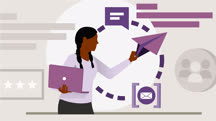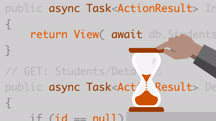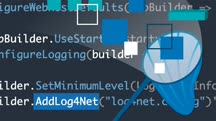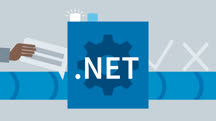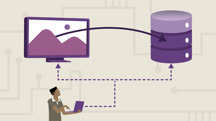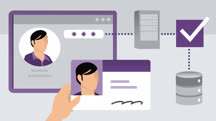Course catalog
Categories
Showing 741-760 of 8,871 items.
Asking for Feedback as an Employee
Learn how to take ownership of your professional growth by asking for and receiving meaningful feedback.
Asking Great Sales Questions
Learn how to ask sales questions that lead to high-quality interactions with customers and clients.
ASP.NET Core Identity: Authentication Management
Learn how to authenticate users in ASP.NET Core. See how to set up the .NET Core Identity system, use external login providers, and implement a cookie-based authentication system.
ASP.NET Core Identity: Authorization Management
Learn how to authorize varying levels of access and add layers of security to your ASP.NET Core applications.
ASP.NET Core New Features
Learn about all the helpful new features and functionality present in ASP.NET Core 1.0, 1.1, 2.0, and 2.1, and explore the benefits offered by each iteration of the web framework.
ASP.NET Core: Communication Management
Discover how to integrate email services into your ASP.NET Core application. Learn how to use services such as SendGrid to send and track emails and help build your business.
ASP.NET Core: Converting Synchronous Calls to Asynchronous
Learn how to switch from synchronous programming to asynchronous programming—and vice versa—in ASP.NET Core and Entity Framework Core.
ASP.NET Core: Exception Handling (233135)
When things go bad, good programmers are ready. Exception handling allows you to ensure your applications respond to errors with grace. With the right exception handling, your user’s experience will never be disrupted. This course teaches the basics of handling exceptions in the ASP.NET Core framework. Instructor Ervis Trupja starts with an overview of exception handling and then works through the various techniques to catch exceptions in ASP.NET. Learn how to use try-catch-finally to identify and handle errors, using both built-in and custom exception types. Then discover how to handle errors more efficiently with global handlers, and add exception filters to your .NET Core applications to apply global policies to unhandled exceptions.
ASP.NET Core: Health Checks and Logging (229939)
Logging and health checks in ASP.NET Core are vital for enterprise and commercial development. You need to understand what's happening on your site in order to find where problems have occurred, spot security issues, and discover optimization opportunities. In this course, instructor Christian Wenz shows you how to use the logging infrastructure that ASP.NET Core provides and then introduces you to the features that ASP.NET Core offers for health checks, including how to create, register, and customize them. Christian gives you a quick tour of the sample app that you will use in this course. Then he gets into the logging portion of the course, covering topics such as how to configure logging, log to files, log to Azure, use log scopes, and more. After a challenge to see how well you understand logging, Christian discusses ASP.NET Core health checks, including how to configure and add health checks, create a UI to work with health checks, and secure your health check endpoints.
ASP.NET Core: Internationalization
Learn how to take your ASP.NET Core website worldwide. Discover how to configure your code for internationalization, and customize your site's content based on the local culture.
ASP.NET Core: Logging with log4net (232642)
Logging frameworks like log4net can help standardize and streamline the process of event logging: helping developers control which events are output and where to output them. This course teaches a real-world, project-based approach to event logging for ASP.NET Core applications with log4net. Instructor Ervis Trupja explains the benefits of using a logging framework and the options available to you. He then shows how to set up the log4net framework for console, web API apps, and MVC apps, and how to log to different mediums: a regular log file, a rolling file, and a SQL database. Plus, earn how to create a custom exception handler and configure it in the middleware to log exceptions globally.
ASP.NET Core: Middleware
Learn about ASP.NET Core middleware. Find out how to write middleware components to create more modular, efficient code.
ASP.NET Core: Payment Gateways
Learn how to implement payment gateways in ASP.NET Core apps using two popular payment services: Stripe and Braintree.
ASP.NET Core: Razor Pages
Build ASP.NET applications without an MVC framework. Learn how to use Razor Pages to build dynamically rendered pages and secure, interactive forms for your apps.
ASP.NET Core: Security
Explore techniques for building secure ASP.NET Core applications and protecting against common attacks.
ASP.NET Core: Test-Driven Development (112860)
Get practical, hands-on experience implementing test-driven development of ASP.NET Core applications. Apps developed with a solid testing strategy are cleaner, more flexible, and easier to change on the fly. This course provides developers with the baseline knowledge of TDD so they can iterate through both new and existing code. Instructor Richard Rout introduces some helpful tools for ASP.NET Core testing, including Visual Studio, ReSharper, and the xUnit and Mock frameworks. Then he covers concepts such as dependency injection and version control, and shows how to set up a web app for testing. Finally, he walks through the red-green-refactor test cycle, including writing failing and passing tests, running tests, and refactoring code to improve quality.
Note: Examples in this course were developed using C# ASP.NET Core, but the concepts apply to all .NET Core applications.
Note: Examples in this course were developed using C# ASP.NET Core, but the concepts apply to all .NET Core applications.
ASP.NET Core: Token-Based Authentication (218974)
Are you a developer needing to learn about token-based authentication? This course deep dives into the difference between authentication and authorization, the difference between traditional and token-based authentication, and how to set up this new authentication mechanism in .NET Core applications. Instructor Ervis Trupja steps through everything you need to get started with authentication, then shows you how to set up token-based authentication to generate new access and refresh tokens. He covers generating an access token using a refresh token and explains how to sign up and log in users using tokens. Lastly, Ervis demonstrates how to add role-based constraints and configure roles as part of the token claims.
ASP.NET Core: Working with Azure Tables (226658)
After an app is developed and made available to users, making drastic database changes is an almost impossible task unless your data storage is nonrelational. Using nonrelational storage such as Azure Table storage makes it easy to change the database structure if you need to— without breaking the app. In this course, instructor Ervis Trupja helps you get up to speed with Azure Table storage, explaining how to work with it in an ASP.NET Core application using the Cosmos DB Table API. Ervis goes over the differences between SQL and NoSQL databases, as well as what Azure Table storage has to offer. He steps through how to set up Azure Table storage in an ASP.NET Core application. He also explores how to add, update, read, and delete data from tables in Azure Table storage. To wrap up, Ervis covers how to replicate Azure Table storage data globally, allowing users around the world to access your data without experiencing latency.
ASP.NET MVC 5 Essential Training
Learn how to develop modern, dynamic web applications with the ASP.NET MVC 5 framework.
ASP.NET MVC 5 Identity: Authentication and Authorization
Learn how to authenticate and authorize users of your ASP.NET MVC 5 application using login credentials from Facebook, Twitter, Google, Microsoft, and other third-party providers.





